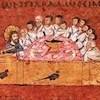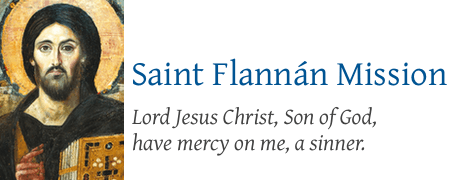 In the Name of the Father and of the Son and of the Holy Spirit, one God. Amen. Dear beloved, this is the Passion Week and Holy Pascha is soon joyfully upon us. Let us remember two fathers among the saints, both named St John, St John Climacus of Sinai, and St John the Hesychast of Colonia. Saints John of Divine Ascent and John of Colonia, pray for us!
In the Name of the Father and of the Son and of the Holy Spirit, one God. Amen. Dear beloved, this is the Passion Week and Holy Pascha is soon joyfully upon us. Let us remember two fathers among the saints, both named St John, St John Climacus of Sinai, and St John the Hesychast of Colonia. Saints John of Divine Ascent and John of Colonia, pray for us!
We remember St John the Hesychast and Bishop of Colonia in Armenia today. St John the Hesychast (or Silent), was born into an influential family. When the saint became an adult, he built a Church and subsequently a monastery. He was consecrated as the Bishop of Colonia, Armenia. However, a decade into his episcopal duties, his brother-in-law tried to mettle with Church matters and the saint ran to Jerusalem, and was accepted as a novice at Saint Savas Monastery there, hiding his episcopal rank. He diligently tended to his novitiate duties. St Savas, abbot of the monastery found St John worthy of priestly ordination some 4 years later. That was when St John had to confide with Patriarch Elias of Jerusalem of his episcopal rank. The Patriarch kept the secret of St John and told St Savas not to ordain St John, and St John was permitted to keep a vow of silence in his cell for yet another 4 years. The saint lived in a hut in the desert later for another 9 years, praying in silence. Eventually, St Savas persuaded St John to return to the monastery. St Savas protected St John when he learned of St John’s episcopal secret. St John was a miracle worker and healer, and lived to 104 years.
Today is Great Thursday of the Mystical Supper, of the week of the Passion of Christ, or Holy Thursday. It is a great day to remember many things, especially that of the Holy Eucharist, which is a holy mystery at the Last Supper of our Lord and Christ with His apostles. On this day, we also learned of the humility of Christ as Shepherd when He bent down on the ground and washed the feet of His disciples. We also remember the emotional agony of our Lord Jesus Christ at the Garden of Gethsemane, and the manner to which He prayed. Lastly, we remember the betrayal of our Christ by Judas, and a timely reminder that we must never be a serpent with a deadly kiss, but a genuine embrace to God our Father, as a loyal and obedient child of His, always mindful of our own failings, through penance and prayer, return to our God’s arms.
In the Old Testament, we remember the Jewish Passover, which commemorates the Exodus, where the Holy Prophet Moses let his people safely out of Egypt from slavery, by the Lord’s Mercy. God’s people abided in His Commandments, and found freedom from slavery.
And we also pass through this period before we celebrate the Holy Pascha (or Easter), in the Julian Calendar, a timely reminder that Christ our Lord also came for us, and died for us, and resurrected for us, to lead us, His people, out of the barren place of sin and suffering, and gift us with the path to salvation and life.
The Holy Eucharist is one of the cornerstones of our faith, and one of the Great Mysteries that we look forward to as followers of the Historic Church. It is a sacred and tremendous blessing not to be taken lightly. But as father among the saints, St John Chrysostom admonished in his “Homily LXXXII on Matthew XXVI 26-28” thus, “Let us also go out unto the hands of the poor, for this spot is the mount of Olives. For the multitude of the poor are olive-trees planted in the house of God, dropping the oil, which is profitable for us there, which the five virgins had, and the others that had not received perished thereby. Having received this, let us enter in that with bright lamps we may meet the bridegroom; having received this, let us go forth hence.” After all, we have been so abundantly blessed by God that we dare not ask any more other than freely giving to the least among us, who may be angels and saints for our own salvation (St Matthew 10:8).
Therefore, in Great Thursday, we also remembered the humility of our Lord Jesus Christ, who showed us the example of what the calling of a servant of the Lord means, when He washed the feet of His disciples (St John 13:14-17). Our Lord also showed how love and respect can be a sign of salvation and forgiven sins, when He said said to Simon, “Do you see this woman? I entered your house, you gave Me no water for My feet, but she has washed My feet with her tears and wiped them with her hair. You gave Me no kiss, but this woman has not ceased to kiss My feet since the time I came in. You did not anoint My head with oil, but this woman has anointed My feet with fragrant oil. Therefore I say to you, her sins, which are many, are forgiven, for she loved much. But to whom little is foregiven, the same loves little.” (St Luke 7:44-47).
In a rare glimpse of our Lord Jesus Christ as a man, even though He was God, we reflect on St Luke 22:40-46, which showed our Lord praying on His knees at the Garden of Gethsemane, at the foot of the Mount of Olives, “Father, if it is Your will, take this cup away from Me; nevertheless not My will, but Yours, be done.” Big beads of sweat fell from our Lord to the ground, when He prayed in great sorrow – not for mere submission, but fearless love for God the Father. And in turn, foretold that Christ our Lord would break the power of death, after His crucifixion and subsequent resurrection. That was a lesson for us who profess our faith unto God – do we have a fearless love for our God?
All things must pass, as in God’s Will, and our Lord Jesus Christ was betrayed by Judas (St Luke 22:47-53). Just as painfully ironical that Judas embraced and kissed Jesus Christ and then betrayed Him, it was a grave lesson to us, that we do not fall prey to succumbing to the temptation of betraying our God for mere material gains. Do we truly seek the Kingdom of God, or do we merely pay lip service and hope for the best?
This brings us to commemorate a great father among the saints, St John Climacus of Sinai, who wrote the Ladder of Divine Ascent.
The Divinely inspired work, Ladder of Divine Ascent, or Scala, was written in 30 chapters, or steps of the Ladder. Although originally intended for monastics, the work is clearly also a model of spiritual perfection for any Christian. It is a book deserving of more than just a read, but putting to deed in life. Let us simply point to a few key words in the Scala, which we can start from.
These few key words stood out – Renunciation, Repentance, Virtues, Prayer, and Peace.
St John Climacus reminded us to be mindful of our passions, especially the likes of pride, vainglory, laziness, and greed, and to build on the virtues. He reminded us of the importance of living in the world and yet not drawn or sunken into the material world. He sang of the importance of repentance and unceasing prayer, which in turn gifts us with the peace of the soul (hesychia) and an undeterred and unaffected being towards suffering (apatheia). The holy father reminded us to be mindful of death, that we are to live today as the last of our life, and therefore spend the day wisely and prayerfully. One exceptionally good advice is to be silent when our hearts are stirred however slightly to anger. We are reminded by Jesus Christ our Lord, that the Kingdom of heaven suffers violence, and the violent take it by force (St Matthew 11:12). This “violence” is not one of aggression or animosity towards others, but being critical and aggressive towards only our own failings, and to seize every struggle seriously towards God. We are to be mindful everyday, for lapses are many, but we soldier on.
Walk the road of our inner monasticism, just as St John Climacus kept vainglory at bay without flaunting his faith, we can keep prayer and repentance close to our hearts, silently as we pray everyday, “Lord Jesus Christ, Son of God, have mercy on me, a sinner”.
Let us close by praying the thanksgiving prayer:
It is truly meet to call thee blest, the Theotokos, ever blessed and most pure, and the Mother of our God. More honorable than the Cherubim, and more glorious than the Seraphim, without corruption thou gavest birth to God the Word: True Theotokos, we magnify thee.
O virgin Theotokos, rejoice; O Mary full of grace, the Lord is with thee. Blessed art thou among women, and blessed is the fruit of thy womb, for thou hast borne the Savior of our souls, Jesus Christ our Lord. Amen.
Fr Raphael+
Readings
Exodus 12:24-28
Proverbs 12:24-28
St Matthew 26:2-20
1 Corinthians 11:23-32

